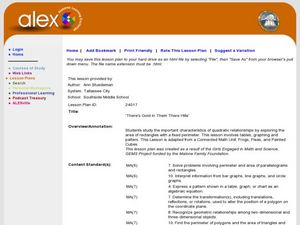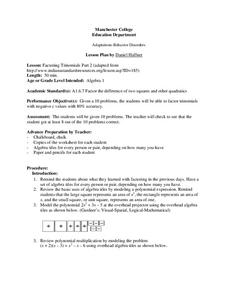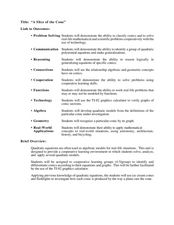Curated OER
System of Two Quadratic Inequalities
Students set up and solve a system of quadratic inequalities related to real-world situations.
Curated OER
Don't Let Parabolas Throw You
Students identify relation, function, patterns and range. In this algebra lesson plan, students factor and graph quadratic equations. They use transformation to move the parabola around and make predictions.
Curated OER
Effects of Parameter Changes
Young scholars define properties of a quadratic equation. In this algebra lesson, students graph and factor quadratic functions. They write equations for polynomials, given a graph.
Curated OER
Quadratic Equations
Tenth graders review algebraic methods of solving quadratic equations. Students discuss several methods of solving quadratic equations. They practice factoring and finding the roots of an equation for solving. A calculator is used to...
Alabama Learning Exchange
Explore the Transformations of Linear and Absolute Value Functions Using Graphing Utilities
Students explore the concept of transformations. For this transformation lesson, students use an applet that is an interactive absolute value graph applet. Students manipulate the applet to examine the change in the function and how it...
Alabama Learning Exchange
There's Gold in Them There Hills
Need to build a laser fence on Mars? For this cute maximizing-area lesson, young explorers pretend to be prospectors on Mars and must determine the best way to use 20 meters of fencing in order to maximize their area. In addition, they...
Curated OER
Describing Data
Your learners will practice many ways of describing data using coordinate algebra in this unit written to address many Common Core State Standards. Simple examples of different ways to organize data are shared and then practice problems...
EngageNY
Successive Differences in Polynomials
Don't give your classes the third degree when working with polynomials! Teach them to recognize the successive differences and identify the degree of the polynomial. The lesson leads learners through a process to develop an understanding...
Curated OER
Logistic Growth Model, Explicit Version
Via the concrete setting of estimating the population of the US, your algebra learners are introduced to a logistic growth model. Comparing and contrasting logistic, exponential, linear and quadratic models, to see which fits the data...
Curated OER
Exponential and Exponents Functions
Students solve problems using exponential properties. In this algebra lesson, students differentiate between exponents, exponential and log functions. They graph their functions using table and exponents.
Curated OER
Discriminant Testing
The class works to identify solutions using the discriminant.They use part of the quadratic formula to find the number of solutions a quadratic equation will have. They calculate how-many times the quadratic function will cut the x-axis....
Curated OER
Maximum, Minimum, Increasing, Decreasing
Learners practice with the StudyCard set on assessing real-world contexts dealing with the concepts of maximum, minimum, increasing and decreasing. They view a variety of quadratic functions and equations with their TI-83 Plus calculators.
Curated OER
Introduction To Functions
Students define a functions and solve problems using functions. In this algebra lesson, students differentiate functions from non-functions. They differentiate between polynomials of higher degrees.
Curated OER
Finding Patterns and Graphing Functions
Students investigate patters for area and perimeter. In this Algebra I/Geometry lesson, students explore two different patterns as they write a formula for the nth term of each pattern. Students graph their results and determine if the...
Curated OER
Polynomials: Factors, Roots and Zeroes
Students factor polynomial equations. In this algebra lesson, students identify the zeros of the equations. They use algebra to rewrite word problems using symbols.
Curated OER
Finite Differences
Young mathematicians solve problems with polynomials. As they graph and analyze polynomial functions, learners define constant and finite, and determine the relationship between the constant set of differences and the slope of a linear...
Curated OER
Collecting Ball Bounce Data
Learners investigate quadratic equations as they use a CBR to collect and analyze data regarding a bouncing ball. Pupils explore different methods for determining the equation of the parabolic path including quadratic regression and...
Curated OER
Factoring Trinomials
Students factor trinomials and other quadratic functions. In this algebra lesson, students solve trinomials containing negative and positive coefficients. They factor quadratics of difference squares as well as regular polynomials.
Curated OER
Clock Problem
In this algebra learning exercise, students observe and identify different parts of a clock using a quadratic function. Their goal is to find two errors in the clock by solving the equation for its roots.
Curated OER
Graphing Solution of a Quadratic and Linear System
In this algebra worksheet, students identify the systems of equation as quadratics or linear. They graph their solutions. There are 4 questions with an answer key.
Curated OER
Algebra I: Multiplying Polynomials and Factoring
Students use concrete models (algebra blocks) to demonstrate their processes for solving quadratic equations. They apply the commutative, associative, and distributive properties to simplify algebraic expressions and to solve quadratic...
Curated OER
"A Slice of the Cone"
Here is a set of lessons that explore conics in a number of different ways. Starting with modeling how a conic is produced by the way a plane cuts the cone, to solving complex word problems, algebra learners progress through a series of...
EngageNY
Linear Systems in Three Variables
Put all that algebra learning to use! Using algebraic strategies, learners solve three-variable systems. They then use the three-variable systems to write a quadratic equation given three points on the parabola.
Mathematics Assessment Project
Generalizing Patterns: Table Tiles
As part of a study of geometric patterns, scholars complete an assessment task determining the number of tiles needed to cover a tabletop. They then evaluate provided sample responses to see different ways to solve the same problems.

























